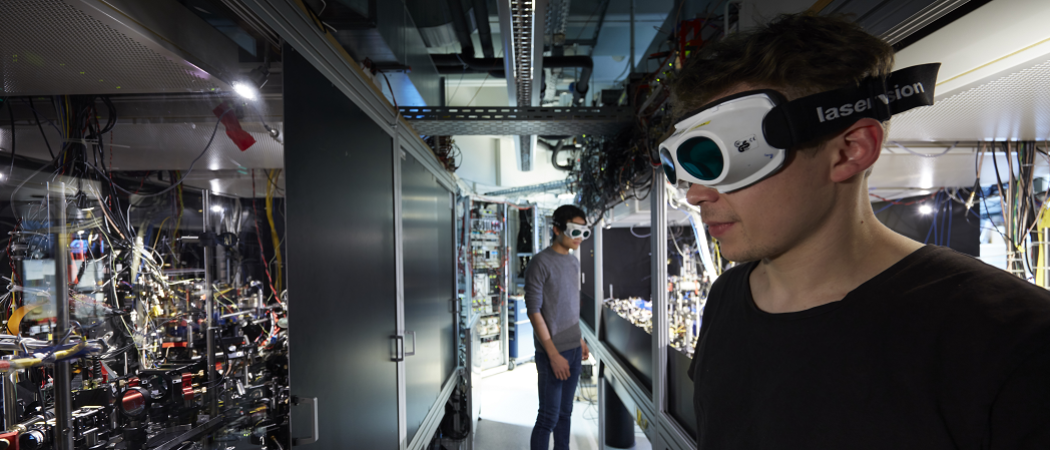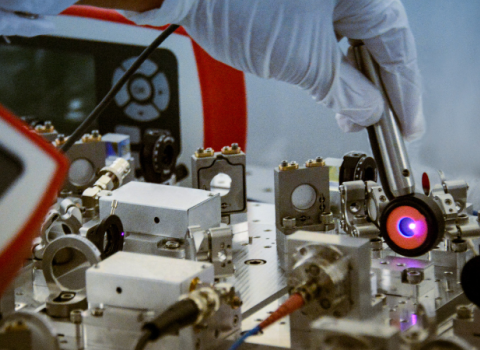€2B from the country’s pandemic recovery fund is to be spent on quantum technology as Germany leads a European push to move the field from research to the mainstream

Scientists from the Munich Center for Quantum Science and Technology working on a Quantum Simulator based on ultra-cold atoms in optical lattices (photo: Jan Greune | MPQ).
Valeria Bartsch first saw quantum technology in action during a 2018 conference in Frankfurt, where US start-up Rigetti Computing was showing its wares at the accompanying trade show.
In a spartan booth, Bartsch was able to see first-hand a laptop run a simple programme via a quantum computer in California.
“It was so amazing,” she said. For her, it was proof that quantum science is starting to move from the lab to the mainstream – raising the realistic possibility of ultra-fast computers and ultra-secure encryption in the not-so-distant future.
Today, as senior R&D manager in the industrial mathematics research group at the Fraunhofer Competence Centre for High Performance Computing in Kaiserslautern, she is involved in a high-profile German-led effort to help Europe catch up with the US, China and others in the field. In July the German government announced a €2 billion quantum effort, supplementing EU plans for €1 billion in investment through 2028. In addition, nineteen EU countries have signed on to develop a joint quantum communication infrastructure across the continent.
There is some significant ground to cover. Between 1991 and early 2017 the US and Japan filed around 500 and 200 quantum patents respectively, according to the EU’s Joint Research Centre. The whole of the EU, with Switzerland, filed just over 100 patents during the same period.
In 2018 US president Donald Trump signed the National Quantum Initiative Act that will provide $1.2 billion (€1.06 billion) over five years for research to “the use of the laws of quantum physics for the storage, transmission, manipulation, or measurement of information.” The initiative got off the ground as US intelligence raised concerns about Chinese dominance in quantum technology in a report in January 2019, saying “deployment of a large-scale quantum computer, even 10 or more years in the future, would put sensitive information encrypted with today’s most widely used algorithms at greatly increased risk of decryption.”
China launched the first ‘quantum satellite’ capable of handling encrypted video calls in 2016 and is due to open a €9 billion National Laboratory for Quantum Information Sciences later this year.
These projects follow a century of theoretical physics research into how a quantum particle can be observed being in two states at the same time, (superposition), or sense a change in another’s condition from a great distance (entanglement).
These properties mean that whereas in conventional computers the unit of information, or bit, has the value 1 or 0, its quantum counterpart, the qubit, can be 1 and 0 at the same time. That raises the prospect of conducting multiple calculations in parallel. To achieve this qubits have to be made to work synchronously, using the entanglement effect.
So far, calculations done on quantum computers appear to make classical computers look primordial. Last October, Google claimed it had achieved ‘quantum supremacy’ – the point at which a quantum computer can do things conventional computers cannot. In the science journal Nature, Google researchers reported that Sycamore, the company’s 53-qubit quantum computer, solved a mathematical problem in 3 minutes 20 seconds, which they said would have taken IBM’s Summit, the world’s most powerful supercomputer 10,000 years.
IBM researchers hit back, saying the task could be performed on a supercomputer in 2.5 days. However, the researchers - who have themselves built a quantum computer – acknowledged, “Google’s experiment is an excellent demonstration of the progress in superconducting-based quantum computing.”
In March Fraunhofer announced the signing of an agreement with IBM to advance quantum computing in Germany. The collaboration will gives companies and research institutions access to IBM quantum computers in Germany and the US, under the umbrella of a nationwide Fraunhofer competence network. The aim is to research the technology and its possible applications, whilst building the skills base needed to support its use in industry.
As part of the collaboration, an IBM Q System One quantum computer will be installed in an IBM computer centre near Stuttgart. The system, scheduled to go into operation in early 2021, will be the first of its kind in Europe.
Absolute zero
Despite advances, quantum computing is far from being ready for the market. Currently, qubits can only be induced to work in temperatures near absolute zero.
“We still need to make the single components better, to have a reliable system at the end,” said Tatjana Wilk, general manager of the Munich Centre for Quantum Science and Technology. “The problem is that in research people cannot build systems, which are aiming to be 50 to 200 qubits large, because they simply do not have the resources to do so.”
European governments are rushing to improve those resources. The UK has earmarked around £1 billion through public and private funding over five years for its National Quantum Technology programme, to support the commercialisation of academic research. One example is the development of quantum sensors for the non-invasive monitoring of brain activity, or for mapping buried infrastructure.
In May, Finland’s state technology research centre VTT, announced a €20-25 million plan to acquire the country’s first, five-qubit quantum computer, as the basis for improving research capabilities and promoting the development and application of quantum technology in different sectors.
In the Netherlands, translation of academic work is underway, with Microsoft last year opening a quantum laboratory at the Delft University of Technology, to research the building blocks for a quantum computer.
In January, France announced the creation of a taskforce to implement a national quantum plan. This focuses on creating the environment to foster development of a quantum sector, through measures such as setting up quantum technology accelerators. The plan has an international outlook, citing Germany specifically as a potential partner to develop quantum technology at a European scale.
Quantum and technological sovereignty
In terms of funding, Germany stands out as Europe’s greatest advocate for quantum computing. In July research minister Anja Karliczek announced €2 billion of the country’s COVID-19 recovery fund will be spent on quantum technology research, with the goal of building an experimental quantum computer by 2021. This federal funding is in addition to a 2018 decision to allocate €650 million up to 2022.
The research has a geopolitical edge in Germany, which has become one of the most vocal proponents of technological sovereignty, putting European self-reliance at the heart of its current presidency of the EU Council.
After the acquisition of a number of German engineering firms by Chinese companies, the final straw was the 2016 hostile takeover of the German industrial robot maker Kuka Robotics by the Chinese appliance manufacturer Midea. The takeover caused widespread angst and as a result Germany introduced tighter rules on future non-EU takeovers of technology companies last November, including companies working with quantum technology.
The German government brought this mindset to its EU presidency, saying innovation in areas such as quantum computing “lays the foundations for achieving technological sovereignty.”
But for that to happen, other foundations need fixing too.
For one, not enough people know about the potential of quantum technology, according to Wilk. “I don’t think there are enough people who do have the knowledge yet,” she said. Although Germany has strong quantum research, more understanding of its potential in needed in other fields for it to progress.
“You need electrical engineers, for example, to design these chips in such a way that efficient computing is possible,” Wilk said.
The limited understanding of the potential is also making it hard to attract venture capital. “One of the key challenges when it comes to raising money for tech startups is the knowledge of investors,” said Niamah Schütter, founder and CEO of Avanetix, a Berlin-based logistics consultancy using quantum computing.
She reckons other countries are five years ahead of Germany, where there is still qubit manufacturing facility.
The venture capital picture is starting to improve; the European Innovation Council’s Accelerator programme has begun investing in European quantum start-ups, as has the French consortium Quantonation.
If Germany has an advantage, it is that applications of quantum technology research are only just beginning to have an impact.
A report by the consulting firm McKinsey says quantum computing may only start generating significant value for industries in the late 2020s.
Wilk believes Germany has strong potential, helped by government funding, new training programmes and a network of researchers across institutions.
As an example of some advances, last year researchers at the Max-Planck institute announced a breakthrough quantum simulator that mimics the quantum chemistry of molecules. Meanwhile, researchers at the Helmholtz institute are aiming to build a 100-qubit computer by next year, as part of the EU’s OpenSuperQ project.
Wilk cautions against thinking any one country can lead the way at such an early stage. “It’s not clear yet which technology will actually win the race, so one has to invest in different technologies,” she said.





 A unique international forum for public research organisations and companies to connect their external engagement with strategic interests around their R&D system.
A unique international forum for public research organisations and companies to connect their external engagement with strategic interests around their R&D system.